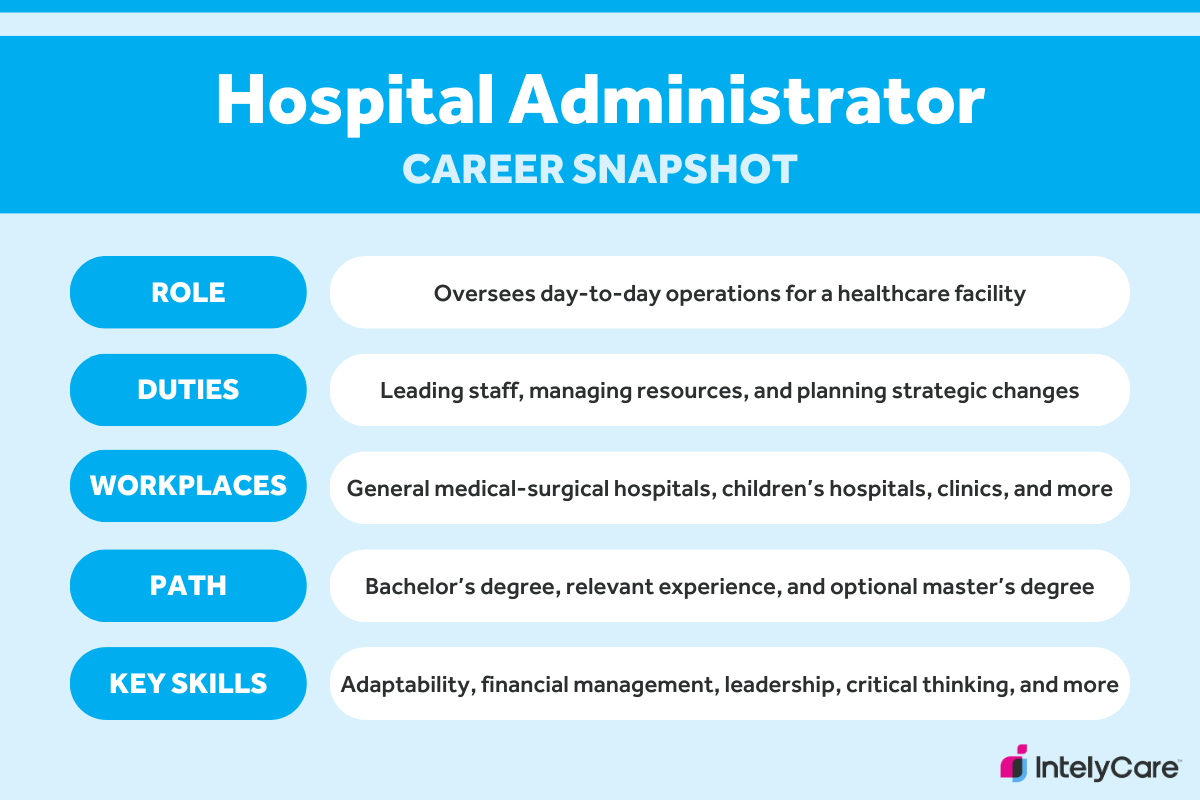How to Become a Hospital Administrator

If you’re looking for a non-bedside nursing career, hospital administration could be a great option. Medical and health service management roles are expected to grow by 28% in the next decade, making this a stable and promising career choice. Think you would enjoy problem-solving with an interdisciplinary team? You might be curious to learn how to become a hospital administrator.
These professionals work in healthcare organizations, like children’s hospitals, clinics, and large medical facilities. To thrive in this dynamic and demanding role, you’ll need a diverse set of strengths and attributes. Hospital administrators work within a chain of command, and it’s important to know this hierarchy to understand how decisions are made. Here’s an outline of hospital administration hierarchy:
- Patient care providers— such as nurses, nurse aides, physicians, nurse practitioners, and physician’s assistants — provide patient-facing care. Laboratory staff, diagnostic professionals, and maintenance and cleaning departments are also essential for patient care.
- Team managers supervise patient care providers, implementing policies and keeping staff motivated. For instance, nursing unit managers and clinical supervisors help ensure units are staffed, scheduled, and stocked with supplies. Other team managers may supervise physicians, marketing, or finance departments.
- Department administrators supervise whole departments or service lines of the hospital. For example, if a hospital has several specialized cardiac nursing units, each of these will have a unit manager, with the cardiac nursing department supervisor overseeing them.
- Hospital executives oversee broader areas of the hospital and healthcare business. For example, the chief nursing officer (CNO) leads clinical operations specific to nursing, overseeing department heads and leading policy change. The chief financial officer (CFO) is responsible for financial planning, budgeting, and the hospital’s fiscal health.
- Hospital board leadership is responsible for large-scale goal setting and charting a course for the future. The board holds the ultimate responsibility for the hospital’s performance and ensures that it fulfills its mission. Directors often bring expertise in various fields, contributing to strategic decision-making.
Wondering where hospital administrators fit into this hierarchy? If you choose this career path, you could find yourself advancing into any of the non-patient-facing roles on this list. Whether you imagine yourself managing patient care providers or making hospital-wide decisions, learning how to become a hospital administrator can help you grow into a wide range of leadership roles.

What Does a Hospital Administrator Do?
Hospital administrators oversee day-to-day hospital functioning, manage resources such as staffing, and steer organizational strategies to improve patient outcomes. Although there are a few different types of hospitals, the daily tasks of a hospital administrator generally fall under one of these three categories:
Leading Staff
Administrators help staff solve problems, resolve disputes, and develop as healthcare professionals. They work to foster a positive work environment so that everyone can do their jobs well. This may also include recruiting new staff, training, and performing performance evaluations.
Resource Management
Hospital administrators have strict budgets to follow and work to allocate resources fairly for the unit. This may mean making decisions about how much supplies to buy, how many nurses to staff on each shift, or how much budget to allocate for continuing education.
Strategic Planning
Administrators have specific quality improvement objectives to implement, so part of their job is practical planning. They also need to measure outcomes of interventions and report on their team’s progress towards hospital goals.
Essential Skills for Hospital Administrators
Being a hospital administrator can be challenging — you’ll deal with varying personalities and even conflicting goals between the people you manage and your supervisors. To do this role well, you’ll need to build these essential skills:
- Leadership
- Financial management
- Adaptability
- Interpersonal communication
- Regulatory knowledge
- Management ethics
- Negotiation skills
- Critical thinking
How Much Do Hospital Administrators Make?
If you’re seeking a role that pays well, this might be a great career for you. The average salary for medical and health services managers in general medical and surgical hospitals is $145,390 per year. Gaining experience, additional degrees, and certifications are the best ways to leverage yourself into a higher-paying role.
How to Become a Hospital Administrator: 4 Steps
How long does it take to become a hospital administrator? If you don’t yet have a bachelor’s degree, it may take 7–10 years to move up to a supervisory role in a hospital. If you’re already a clinician, such as a nurse, you may be able to move up the ladder faster. Here’s how to get started:
Step 1: Get a Relevant Bachelor’s Degree
Hospital administrator jobs require at least a bachelor’s degree, and often a master’s degree. This foundational education provides essential knowledge in areas such as healthcare systems, management principles, and organizational behavior. Relevant hospital administration degree options include:
- Healthcare administration
- Business administration
- Nursing
- Public health
Step 2: Gain Experience
Gain practical experience by working in entry-level healthcare roles or administrative positions within healthcare settings. This hands-on experience will help you understand the complex dynamics of patient care, and gain practical knowledge that complements your academic learning.
Climbing the career ladder into hospital administration will likely be easier within the same domain as your previous role. For example, if you’re a nurse, you’ll first start looking for roles supervising nurses. You might first move up to clinical supervisor, then become a unit manager or department leader in time.
Step 3: Get a Master’s Degree
While a master’s-level education isn’t strictly necessary for this role, you’ll likely find that having this education gives you an edge. Elevate your qualifications by pursuing a master’s in hospital administration or a closely related field, like business, finance, or management. Many programs will allow you to continue working while taking classes.
Step 4: Continuing Education and Professional Development
Another way to give yourself more career options is to continue investing in your professional development. Enhance your credibility and stay current by obtaining relevant certifications. Check out these designations to further your expertise in hospital administration:
- Fellow of the American College of Healthcare Executives (FACHE)
- Certified Medical Manager (CMM)
- Certified Healthcare Administrative Professional (CHAP)
- Certified Professional in Health Care Risk Management (CPHRM)
Looking For a Career Move?
Now that you know how to become a hospital administrator, you might be curious about roles where you can gain experience in the medical field. IntelyCare has roles for nursing professionals in post-acute and acute care. Sign up for the latest jobs to get your desired roles right in your inbox.



